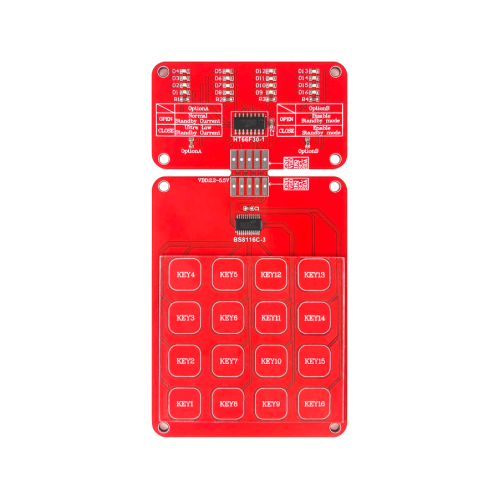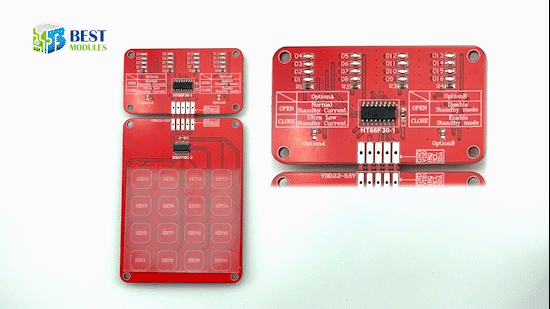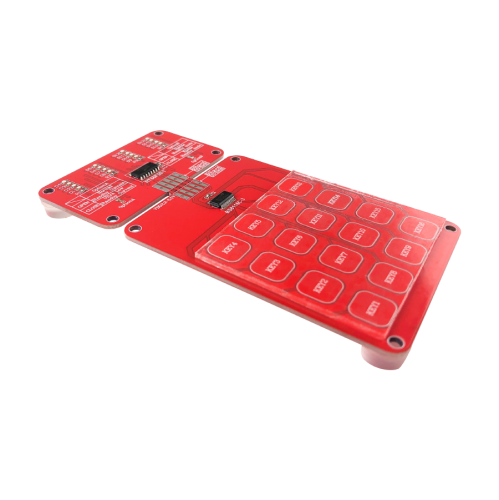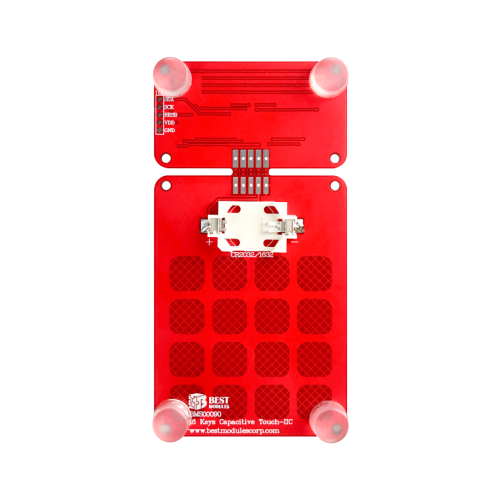Description
FEATURES
Product features
Operating voltage: 2.2V – 5.5V
I2C interface (I2C address: 0x50)
16 touch keys / 16 LED
Option B: enter power-saving mode or not
Option A: enter power-saving mode or extreme power-saving mode (the reaction of touch keys is slower)
Features of the BS81x touch IC series
Low standby current
Auto-calibration
Reliable touch detections
Standby and normal operating modes
Maximum key on duration time detection
Adaptive voltage drop function
Level Hold, selectable active level-low or high
NMOS output with internal pull-high / CMOS Direct Output
Both serial interface and parallel outputs
Sensitivity adjustment using an external capacitor
Minimal number of external components
Features as an evaluation board
Verify the touch sensitivity and the reaction speed of touch keys
Test the features and noise rejection of touch IC
The PCB layout for users reference
Evaluate for thickness of material above touch pad
Evaluate for the size of touch pad
PRODUCT FAQs
Q1: Can the BMS00090 sense touches even if I put materials such as glass or acrylic on it?
Answer: Sure, you can put material on the board, and it is recommended that the maximum thickness is 3mm.
In addition, the material needs to be close to the PCB board.
Q2: How to modify the IRQ mode?
Answer: Please refer to the write setting from the BS8116C-3 datasheet.
(1) Modify the bit0 of the BS8116C-3 setting register address B0H
- Bit0 = 0: level hold mode (it reads the key data when the IRQ is low)
- Bit0 = 1: one-shot mode (when the key status changes, send the one-shot signal)
(2) Example: level hold mode (bit0 = 0)
Q3: How to enter power-saving mode?
Answer:
(1) Modify the bit1 of the BS8116C-3 setting register address B0H
- Bit1 = 0: turn on the power-saving mode
- Bit1 = 1: turn off the power-saving mode
(2) Example: turn off the power-saving mode (bit1 = 1)
Q4: How to adjust the sensitivity and sensing frequency?
Answer:
(1) Modify the bit2 to bit0 of the BS8116C-3 setting register address B3H
- Bit0 = 0: low sensitivity
- Bit0 = 0: low sensitivity
- Bit2 to bit 1 = 00: touch frequency set 1
- Bit2 to bit 1 = 01: touch frequency set 2
- Bit2 to bit 1 = 00: touch frequency set 1
- Bit2 to bit 1 = 11: can’t be used
(2) Example: touch frequency set 1 (Bit2 to bit 1 = 00) and high sensitivity (bit0 = 1)
Q5: How to modify the key trigger threshold value?
Answer:
(1) Modify the bit5 to bit0 of the BS8116C-3 setting register address B5H to C4H
- Bit5 to bit0: users can modify the values (default = 16).
(2) Example: when the key trigger threshold value is 10h (bit5 = 1, bit4 to 0 = 0)
PRODUCT INSTRUCTION
1. Put battery into the battery holder to start up BMS00090.
2. The IRQ pin turns low when users touch the touch key pad. In the meantime, BMS00090 communicates with touch key pad via I2C, and lights up the LED indicator D1 to D16. (Please refer to the BS8116C-3 datasheet for more details)
3. Touch key and I2C status correspondence
0: the key is not touched / 1: the key is touched
Example: reply a byte (03h) when users press the Key1 and Key2.
4. Power-saving mode
Turn-on: connect the OptionB pin to GND (short circuit)
Turn-off: do not connect the OptionB pin (open circuit)
Please restart up BMS00090 after setting up the pin.
5. Extreme power-saving mode
Turn-on: connect the OptionA pin to GND (short circuit)
Turn-off: do not connect the OptionA pin (open circuit)
Please turn on the power-saving mode before turning on this mode. And restart up BMS00090 after setting up the pin.
6. If there is no response to the touch keys, please check whether the battery is reversed, loose contact, or run out of battery.
7. If the brightness of the LED indicators is uneven, it means that the battery level is low and is required a battery replacement.
DEVELOPMENT BOARD INTRODUCTION
PINS INTRODUCTION
RESOURCES
IC : Holtek BS8116C-3, Enhanced Touch Key, including datasheet, package dimension, etc.










Reviews
There are no reviews yet.